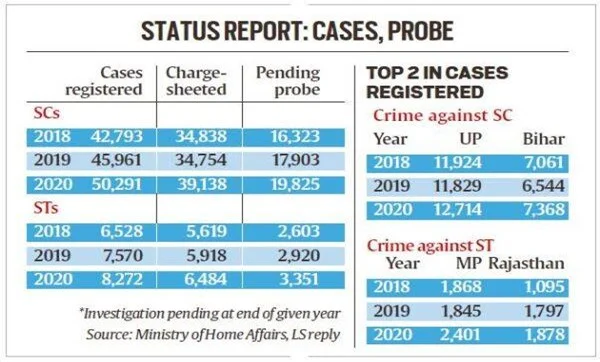Social Issues
Context: Violence against Dalit student in Rajasthan is stark reminder of nation’s unfinished tasks.
- A nine-year-old Dalit child from Rajasthan’s Jalore district succumbed to injuries, inflicted by his teacher.
What happened?
- The boy drank water from the pot that had been kept separately for the savarna jati (upper caste) teacher.
- The teacher abused him with casteist slurs and beat him up, resulting in internal injuries.
This incident should prick the nation’s conscience, and remind policymakers of unmet promises and unfinished tasks, as India begins the “Amrit Kaal” to the centenary of its Independence.
- That casteist violence is a grim lived reality — at odds with India’s constitutional principles — for a large section of the country’s Scheduled Caste (SC) and Scheduled Tribe (ST) communities is borne out by numerous reports and surveys.
- National Crime Records Bureau (NCRB) data show that a crime was committed every 10 minutes against a person from an SC community in 2020.
- Rajasthan along with Bihar, UP and Madhya Pradesh accounts for two-thirds of such crimes though these four states constitute about 40 per cent of the country’s population.
Crimes against Scheduled Castes and Scheduled Tribes
- Cases registered for crime against SCs rose from 42,793 in 2018 to over 50,000 in 2020, and of crime against STs from 6,528 to 8,272 in the same period.

Reasons for Crime against SC/ST:
- Caste discrimnation still exists and not much has changed. It is taking new forms that have led to crimes against dalits from time to time.
- Another factor contributing to the spike in anti-Dalit violence is rising living standards of Dalits, which appears to have led to a backlash from historically privileged communities.
- The increase in crime rates is also a reporting effect. More crimes against Dalits are being reported and registered.
- SC and ST are viewed as enjoying all the privileges through reservation, thereby leading to a feeling of hatred for them.
Provisions safeguarding the rights of SCs and Sts in India
The Indian Government has enacted laws to remove negative discrimination and has also brought in many reforms to improve the quality of life for the weaker sections of society. Few among them are:
- Constitutionally guaranteed fundamental human rights
- Provision of reservations in places like educational institutions, for employment opportunities etc
- Establishing social welfare departments and national commissions for the welfare of scheduled castes and tribes.
- Scheduled Castes and Tribes (Prevention of Atrocities) Act.
- Right to Equality
- Articles 14, 15, 16, 17 and 18 of the Constitution of India highlight the Right to Equality in detail.
What needs to be done?
- SC/ST commission should start a national helpline number for any harassment on the basis of caste.
- Improving the training of police officers in dealing with POA cases so that they can solve the cases without any pressure or prejudice.
- Efficient implementation of Scheduled Castes and Tribes (Prevention of Atrocities) Act
- Increasing awareness about several legal remedies and different rights available to the marginalised community.
- State Protection of a witness is a must in order to raise voice against atrocities.
Source: Indian Express











